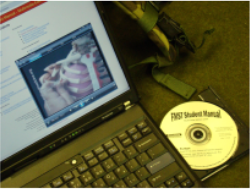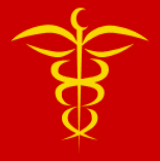Hospital Corpsman Sickcall Screener's Handbook
BUMEDINST 6550:9A
Naval Hospital Great Lakes
1999
Utilization of Military Sick Call Screeners
Policy and guidance for the Military Sick Call Screener Program is contained in BUMEDINST 6550.9B
|
 |
|
FMST Student Manual Multimedia CD
30 Operational Medicine Textbooks/Manuals
30 Operational Medicine Videos
"Just in Time" Initial and Refresher Training
Durable Field-Deployable Storage Case |
The primary goal of the Military Sick Call Screener Program is to provide timely, quality care for active duty personnel with minor medical conditions. Screeners are not to function as independent providers. They must work under the direct supervision of a medical officer who is responsible for the care they provide.
The following guidelines must be followed:
-
The SOAP format must be used when evaluating a patient. This will include the history, physical examination, assessment, and treatment.
-
The Military Sick Call Screener will consult with the supervising medical officer prior to the patient leaving the treatment facility. Military Sick Call Screeners will have 100% of their records reviewed by the supervising medical officer and countersigned.
-
A screener may order a CBC and urinalysis. Any other studies must be ordered by the supervising MO/PA/IDC.
-
Screeners must realize their limitations and immediately refer to an MO/PA/IDC any patient with one of the following conditions:
-
Febrile illness with temp. exceeding 101° F.
-
Acute distress such as, breathing difficulties, chest pain, acute abdominal pain, suspected fractures, lacerations, etc.
-
Altered mental states
-
Unexplained pulse above 120 per minute
-
Unexplained respiratory rate above 28 or less then 12 per minute
-
Diastolic blood pressure over 100 mm Hg
If any uncertainty or doubt in the assessment of the patient's medical condition exists, refer to your medical officer. Also, if any patient presents with the same complaint twice in a single episode of care, he must be referred to a medical officer for evaluation and treatment. The only exception is patients returning for routine follow up of a resolving acute minor illness or injury.
-
All prescriptions written will be signed by the supervising MO/PA/IDC.
|
|
Approved for public release;
Distribution is unlimited.
The listing of any non-Federal product in this CD is not an endorsement of the
product itself, but simply an acknowledgement of the source.
Bureau of Medicine and Surgery
Department of the Navy
2300 E Street NW
Washington, D.C
20372-5300 |
Operational Medicine
Health Care in Military Settings
CAPT Michael John Hughey, MC, USNR
NAVMED P-5139
January 1, 2001 |
United States Special Operations
Command
7701 Tampa Point Blvd.
MacDill AFB, Florida
33621-5323 |
*This web version is provided by
The Brookside Associates Medical Education Division. It contains
original contents from the official US Navy NAVMED P-5139, but has been
reformatted for web access and includes advertising and links that were not
present in the original version. This web version has not been approved by the
Department of the Navy or the Department of Defense. The presence of any
advertising on these pages does not constitute an endorsement of that product or
service by either the US Department of Defense or the Brookside Associates. The
Brookside Associates is a private organization, not affiliated with the United
States Department of Defense.
Contact Us · Other
Brookside Products

|
|
Operational Medicine 2001
Contents
|
|


